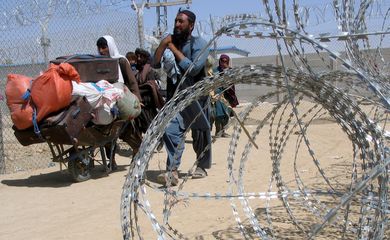Over 100 Afghans still camping in São Paulo airport

Everyday, dozens of Afghans continue arriving at the Guarulhos International Airport, in the metropolitan region of São Paulo. Bearing humanitarian visas, many land in Brazil and end up setting up camp at the airport, unable as they are to find housing or employment.

This week, when Agência Brasil reporters visited the airport again, a hundred Afghans were still living in Terminal 2. According to city authorities, there were 116 Afghans awaiting shelter while living at the airport on Tuesday (Oct. 25).
Some of them have been at the airport for nearly 20 days. The flow, however, is ongoing. Some stay for weeks. Some arrived a few days ago. That is the case of a 27-year-old Afghan woman* who used to work with social media for a public agency. She came with her husband to Brazil five days ago and says she left her country because, as the Taliban took power in Afghanistan, she can no longer have a profession. Since she is a woman, she is also not allowed to study. “I hope I can find a good place to live in Brazil. This airport is not a home. There are no beds. These are not good living conditions,” she said.
Some do find a place to live—like the 26-year-old Afghan woman who arrived in the country with her two sisters. They were living at the airport for 14 days until—thanks to volunteers working at the airport since August—she managed to find a house to stay in. “I am in a house and I’m happy,” she declared. Now she hopes the country can offer other opportunities for her. “I hope Brazil will give me a chance to make my dreams come true. My dream is to pursue a master’s degree and get a job,” she stated.
Humanitarian reasons
Visas for Afghan citizens started being issued in September 2021 through an Interministerial Ordinance that authorized temporary visas and residence permits for humanitarian reasons for Afghan nationals, stateless persons, and violence victims from Afghanistan, Federal Public Defender Guillermo Rojas de Cerqueira César stated.
“According to data from UNHCR [United Nations High Commissioner for Refugees], 5,846 humanitarian visas were granted under the ordinance between the beginning of September last year and the beginning of the same month this year. According to the Federal Police, the entry of 2,240 Afghans in Brazil was allowed,” the official added.
Upon arrival in Brazil, Afghans receive food, water, clothing, and vaccines distributed by the Guarulhos city hall or by volunteers. But Brazilian migration law protects the rights of these Afghans to housing, employment, legal assistance, education, and access to social programs and benefits.
“That’s the big bottleneck. It seems that the government has underestimated the inflow of these immigrants and has not offered an adequate settlement plan, which has left them with no assistance. As it stands today, we have an emergency shelter, but no adequate public policy to welcome these people,” he went on to say.
Volunteers
“We have reports of people with training in various courses and higher education. They want to work, but they can’t find a chance here, which was promised them upon arrival in Brazil. They are taking refuge in the airport—a place of passage, not a place of shelter. This is inhumane,” said Otília Christiane Silva Afonso, from the Afghan Front Collective.
Researcher and sociologist Mariana Gerbassi, 25, is also a member of the collective and has been working voluntarily to welcome the Afghans. “They need a job to support themselves. Without a place to live, they can’t get a job. Without a job, they must rely on public housing. And public housing has the problem of not meeting the realities of Afghan families,” he noted.
Since August, volunteers have been going to the airport every day. They are the ones who have been calling on the authorities, collecting donations and offering food, clothes, showers, shelter, even medical and psychological care and Portuguese classes for the Afghans arriving in the country.
“[Guarulhos] city has helped with lunch and hot meals. But they only have breakfast and fruit thanks to society members,” added Gerbassi.
Increasing demand
Since January, the Humanized Assistance Stations for Migrants, installed in the airport, has helped 1,138 Afghans—an average of 126 per month. In October alone, 237 turned to the center for assistance.
Because of this increased demand, the city opened a transitional residence for migrants and refugees, with a capacity to house 27 people. However, the place has reached its full capacity. On October 7, in a bid to provide emergency shelter for Afghan families with elderly and disabled members and pregnant women, 20 new beds were made available—still not enough to meet the demand, which grows every day.
Contacted by Agência Brasil, the State Department of Social Development said it is investing BRL 2.8 million in 100 beds and that half of these are being used to open 50 spots until December in a shelter house in Guarulhos. The rest is being directed at 50 Afghans who currently living in the Terra Nova shelter house in São Paulo city.
The State Secretariat of Justice and Citizenship also stated it has assisted about 70 Afghans with document issuance, refugee protocols, regularization, vaccines, and clothes. Two collective efforts were conducted for these services: one in September and the other in October.
In a statement, the Ministry of Foreign Affairs said it has partnered up with specialized agencies of the United Nations “in order to seek solutions to cases of greater vulnerability.”
“In most cases, the coming of Afghans to Brazil was mediated by organizations, which welcome them and foster their local integration. A minority of Afghans do not find this prior support from society and land in the country under vulnerability. Social assistance must be provided for them by the relevant public entities. Even though it does not have this specific legal competence, the Foreign Ministry has held talks and suggested measures to other government entities involved, at federal, state, and municipal levels,” the ministry said in a statement.
The ministry also declared it has met with representatives from Brasília-based embassies to raise financial support for the reception efforts.
*The names of the people interviewed have not been disclosed for privacy reasons.





